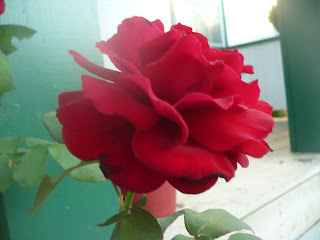I feel a sudden desire to spread used
coffee grounds under my rose bushes, to get a rain barrel and to spray my
powdery mildew infested roses with a mixture of nine parts water and one part
milk. Suddenly, I’m imagining landscaping projects, new plants and what my lawn
would look like if I tore up all the grass in favour of the natural, wildflower
look.
All I did was sit down and read Karen
York’s book. I’m a gardener and good books about gardening get me excited, but
this one is especially unique. York addresses the concept of the garden as a
place of healing and stress relief.
The “healing” York has in mind is not
physical healing, but rather the process of using nature “to restore a person
to spiritual wholeness,” and to set right the relationship between ourselves and
the earth.
It comes as no surprise to me when York
notes the therapeutic effects of nature and of the act of gardening. I
discovered a number of years ago the power weeding as a method for stress relief.
The more time I spend in my garden, the happier and more peaceful I feel.
In her book, York covers everything from
soil quality and landscape setup, to rooftop gardens, wild flowers and edible
plants. One of the most interesting chapters was the one on soil, titles “A
Sense of Humus.”
In chapter one York discusses eight
elements of the “Healing Garden” design. An inviting entry, diverse and interesting
sensual stimulation, enclosure, a sense of mystery, natural forms, light/ dark,
and places for one person or more, are all important aspects of York’s ideal
garden.
One of my favourite observations made by
York is a reminder that “the garden is not an escape from reality; it’s an escape to
reality.”
York is concerned with having things in
harmony with each other and with letting the garden be natural. She stresses biodiversity
and water conservation. She criticizes the modern concept of having a monoculture
lawn, calling the traditional yard a “blandscape.” She rejects tilling and
favours natural remedies for pests and plant diseases over chemical ones.
“One person’s wildflower is another
person’s weed,” York writes. The line is telling of her whole philosophy. It all
comes down to synergy. Every system in nature is synergenic, meaning “the whole
produces a different effect from what the parts produce on their own.” Because
everything interrelates, it must be balanced.
York’s gardening advice is not just
practical, but is philosophical too. This makes sense. When it comes to
gardening, the practical and the philosophical have always been interwoven in
my mind. If you’re a serious gardener, or becoming a serious gardener, this
book is definitely worth a read.
As
a final thought, York says, “The garden grows with you, and you grow with the
garden in a mutual search for balance and serenity.”


No comments:
Post a Comment